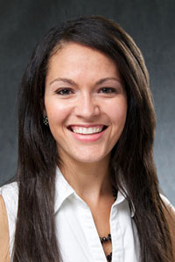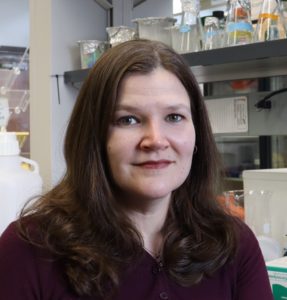Keynote Bios and Abstracts
Renata Pereira Alambert, University of Iowa

Renata Pereira Alambert is an Assistant Professor in the Department on Internal Medicine, Division of Endocrinology and Diabetes, at the University of Iowa, where I am also a member of the Fraternal Order of Eagles Diabetes Research Center (FOEDRC). She obtained her Ph.D. in Human and Experimental Biology at Rio de Janeiro State University, in Brazil. As a post-doctoral fellow, at the University of Utah, her work focused on investigating the role of substrate metabolism in the adaptation to pressure overload-induced cardiac hypertrophy (POH). As an Assistant Professor at the University of Iowa, her independent research focuses on investigating the role of mitochondrial function and dynamics and stress response pathways in the pathophysiology of obesity, insulin resistance and diabetes. In 2015, She was awarded the Scientist Development Grant from the American Heart Association to investigate the role of the mitochondrial fusion protein optic atrophy 1 (OPA1) on skeletal muscle. Data obtained from these studies were published in the EMBO Journal in 2017, and revealed that mitochondrial dysfunction in muscle results in an adaptive response leading to systemic metabolic protection via secretion of FGF21 as a myokine. Her recent studies investigating the role of OPA1 in adipose tissue have yielded two separate manuscripts (one under revision, and the other in preparation). In summary, Dr. Pereira and her team identified a pathway, the integrated stress response (ISR), that can be activated in brown adipose tissue (BAT) in response to mitochondrial stress and cold to coordinate systemic metabolic adaptations that improve metabolic fitness. Her recently funded RO1 grant aims at investigating the role of the ISR on brown fat thermogenesis and on the regulation of BAT secretome to combat metabolic diseases.

Gwendolynn Fine, MHA, MBA, University of Northern Iowa Graduate 2014
Gwendolynn D. Fine was born and raised in Gary, IN. From a young age, Gwen has loved science and research. After graduating from West Side Leadership Academy, Gwen accepted the Bridge Scholarship to the University of Northern Iowa. Gwen majored in Biology and was able to perform research through the UNI-National AG-Based Lubricants Center and worked in the Student Worker program at John Deere Waterworks in Safety and Quality until graduation. Gwen worked at Tyson Fresh Meats in Waterloo, IA as a Microbiologist/Chemist in the laboratory, performing sterility and potency testing on different meats and lards. In 2015, Gwen moved to Indianapolis to complete her Master’s in Healthcare Administration from University of Saint Francis. While in graduate school, she worked for Indiana University Health in the Molecular Biology Pathology Laboratory as a Medical Technologist II before being transitioned to the Office of Compliance, Accreditation, and Quality as a Quality Assurance Coordinator. After completing her MBA from USF, Gwendolynn began working as a Quality and Regulatory Specialist II for a biomedical company. While having a strong scientific and quality, Gwen is planning a course for future PhD studies, hopefully in Regenerative Medicine and Engineering. While not working, Gwendolynn enjoys spending time with family &friends, being active, and indoor gardening.
Balaji Narasimhan, Iowa State University

Balaji Narasimhan is an Anson Marston Distinguished Professor of Engineering and holds the Vlasta Klima Balloun Faculty Chair in the Chemical and Biological Engineering department at Iowa State University (ISU). He has been at ISU since 2001 before which he was on the faculty of the Department of Chemical and Biochemical Engineering at Rutgers University. He served as Associate Dean of Research in the ISU College of Engineering from 2007 to 2013 and oversaw record growths in the college’s research portfolio and doctoral degree production. Currently, he directs the Nanovaccine Institute, an interdisciplinary consortium of 70 researchers from 21 universities, national laboratories, research institutes, companies, and hospitals that is focused on the design and development of next generation nanovaccines and nanotherapeutics. He is a co-founder of a startup called ImmunoNanoMed Inc.
Narasimhan’s research is focused on the molecular design of nanoscale polymer systems and biomaterials to precisely control molecular architecture and functionality in these systems. His research has received funding from NSF, NIH, DOD, DOE, USDA, VA, the Bill and Melinda Gates Foundation, the Whitaker Foundation, the Roy J. Carver Foundation, the W.M. Keck Foundation, the Camille and Henry Dreyfus Foundation, and industry. His current research thrusts are in the areas of engineered biomaterials for controlled delivery of drugs, peptides, and vaccines, metabolically optimized nanovaccines, and functionalized nanomedicines. Narasimhan has published over 280 refereed journal papers, book chapters, and proceedings papers, co-invented ten patents, edited three textbooks, and delivered over 400 invited and contributed national and international lectures.
He has won various awards including the Society of Biomaterials Clemson Award for Contributions to the Literature, the Whitaker Foundation Biomedical Engineering Research Award, the 3M Non-Tenured Faculty Award, the TR-100 Award by MIT’s Technology Review Magazine, and the Best Doctoral Dissertation in Mathematics, Physical Sciences, and Engineering at Purdue University. He is an elected Fellow of the American Institute of Medical and Biological Engineering, the American Association for the Advancement of Science, the International Academy of Medical and Biological Engineering, and the National Academy of Inventors. He is an Associate Editor of Science Advances and a Section Editor of Current Opinion in Chemical Engineering.
He received a B. Tech. in Chemical Engineering from the Indian Institute of Technology, Bombay (India) in 1992 and a Ph.D. from Purdue University in 1996. He completed his postdoctoral work at MIT.

Cindy Toll, University of Iowa
Cindy Toll is the Manager of the Carver Center for Genomics, a research and service center in the Department of Biology at the University of Iowa. She received Masters degrees in Biological Anthropology (2002) and Science Education (2004) at the University of Iowa. Following her graduate work, she joined the lab of Dr. John Logsdon at University of Iowa, and assisted in research on the origin and evolution of sex and meiosis in a variety of eukaryotes. She more recently served at the Lab Coordinator for three large introductory biology courses, helping reshape the lab curriculum and ultimately manage the transition to virtual labs at the start of the COVID-19 era. Her current work includes supporting PIs and students from the department in their genomics research endeavors.
